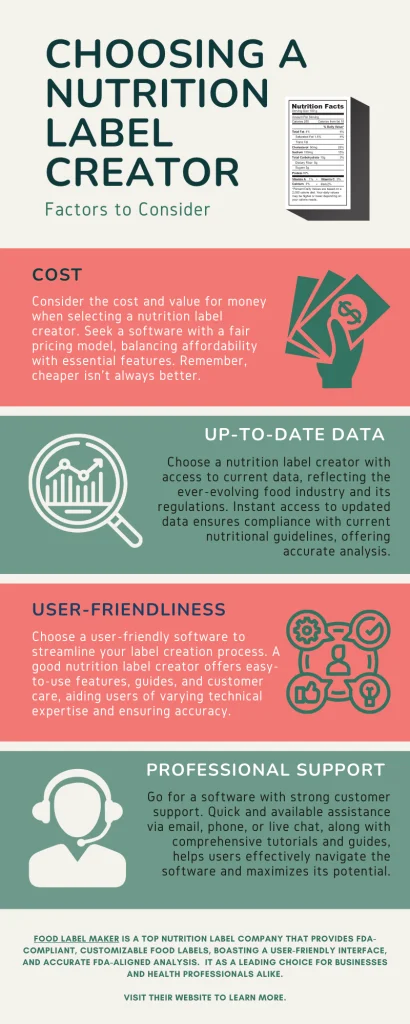Introduction
Understanding the nutritional composition and nutritional value of your food products is crucial. It’s not just about following regulatory standards, but also about providing transparency and benefit to your customer base.
Investing in robust nutrition analysis software is a strategic move for any company in the food and beverage space. The right software can streamline your processes, ensure accuracy in your nutrition labels, and ultimately, enhance your product’s marketability. However, with a multitude of options available, selecting the most suitable solution for your business can be a complex task.
This article aims to guide businesses through the importance of nutrition analysis software and offers insightful tips on choosing a solution that aligns with your specific needs and objectives.
Summary
- Nutrition analysis is the process of determining the nutritional content of the food or food products an individual consumes.
- This analysis, as well as the nutrition facts labels where this information is presented, allow individuals to compare the nutritional value of different foods and make informed dietary choices from that knowledge.
- The benefits of nutritional analysis software include:
- Automatic regulatory compliance
- Instant access to up-to-date nutrition data
- Flexibility
- Scalability
- Increased efficiency
- When choosing nutrition analysis software for your own business, it is important to consider factors such as cost or value for money, up-to-date data and data compliancy, user-friendliness, and the level of professional support you will receive.
- Food Label Maker is a leading nutritional label creator and nutrition analysis software company that offers a comprehensive database, intuitive interface, accurate analysis, and customization options.
See How FoodLabelMaker Can Help You
What Is Nutrition Analysis?
Nutrition analysis is the process of systematically and scientifically determining the nutritional content of the food or food products you consume. This includes measuring the amounts of macronutrients (which are made up of carbohydrates, proteins, and fats) and micronutrients (which are vitamins and minerals) that are present in a food item.
The advancement in nutrition sciences now allows for nutritional analysis at a microscopic level, including examination of nutritional components and nutritive values, among other aspects. Understanding the nutritional values of food offers a comprehensive view of the various components present in the product.
This process has recently evolved from being more manual to completely automated and done-for-you thanks to nutrition analysis software. Using software makes nutrition calculations easier and more efficient and allows individuals to gain a deeper understanding of their dietary habits. It is also far more accurate thanks to various regulations and standards set out by the FDA (Food and Drug Administration).
Nutrition analysis and nutrition analysis software are also not only limited to individuals. Businesses in the food industry, dieticians, and health professionals need this software to make sure that accurate nutritional information is provided to their client base. The analysis process can be performed manually but automated software makes it that much easier by providing databases of thousands of food items, allowing you to quickly search and select the food you want to analyze. The software then calculates the nutritional content based on standard serving sizes. This saves a lot of time and labor costs and removes the reliance on expensive lab analysis to do the job for you.
Boasting over five years of both academic and hands-on clinical practice, Faheem Mustafa is a credentialed dietician deeply rooted in the fields of nutrition and dietetics. His expertise lies in crafting individualized meal plans and developing recipes. His scholarly contributions, including various articles in prestigious journals, have garnered him multiple recognitions. With his extensive background as a dietitian and frequent use of nutritional analysis software, he has been utilizing spreadsheets for years to conduct nutrition analyses for his clients.
Faheem reiterates that,
“Although it served its purpose, I couldn’t help but notice its limitations and the inefficiencies it brought to my workflow. By embracing nutrition analysis software, I have experienced a significant transformation in my practice. The software offers seamless access to a vast database of nutritional information, enabling me to effortlessly provide my clients with comprehensive and accurate dietary analyses. With a user-friendly interface and instant results, I can now offer a more personalized and efficient service to help my clients achieve their health goals.”
By analyzing the nutritional content of the food that is specific to a population, food businesses can now make it easier for their customers to identify such products through food labels. This enables them to promote a product specifically tailored to a certain target population, aiding in the inclusivity and accessibility of a number of foods to people with a certain disease or condition.
For example, if a person has gluten sensitivity or celiac disease; or is lactose intolerant, that person will need to follow a specific diet and omit certain nutrients and their food sources such as lactose that is present in dairy, and gluten, which is present in wheat and some other grains. While shopping at a grocery store, easy-to-understand food labels will help such a person in identifying the accurate food products by looking at the food labels and the nutritional content of food items.
Thus, it is very crucial for businesses to come up with recipes and food items that are tailored to people’s needs, and food label-generating software helps make it easier for them and their consumers.
Benefits of Using Nutrition Fact Software
Making use of nutrition fact software offers numerous benefits for businesses in the food and beverage industry in particular. For starters, it utilizes in-depth nutrition analysis in its automation processes so that data and nutritional information are accurate. From that point on, it ensures the precise and efficient creation of FDA-compliant nutrition facts labels, ultimately saving time, reducing errors, and accommodating dietary preferences while also being scalable to your business needs.
Other reasons why it would be beneficial to use nutrition fact software are:
Easy Regulatory Compliance
When creating a food label for your product, many companies don’t know where to start when it comes to regulatory compliance for their food labels. This is where nutrition fact software comes in.
It provides a user-friendly interface and automated features that guide users through the creation of nutrition facts labels by FDA regulations. With the software’s intuitive tools, businesses can rest assured that their labels are accurate, up-to-date, and compliant, saving time and minimizing errors. By streamlining the compliance process, nutrition analysis software allows businesses to focus on delivering high-quality products while maintaining regulatory standards.
Instant Access To Nutrition Data
Access to comprehensive nutrition data is essential for businesses in the food and beverage industry, and nutrition analysis software provides instant access to such information. With a vast database of ingredients, macronutrients, vitamins, and minerals, businesses can retrieve accurate and reliable nutrition data for their recipes and products.
This enables informed decision-making, recipe optimization, and precise creation of nutrition facts labels. Having instant access to nutrition data also empowers businesses to effectively communicate the nutritional value of their products to consumers, which further allows for transparency in marketing strategies and packaging.
The ingredient database in the software is a vital component of nutrition analysis. Users can also access the nutritional values of a wide range of ingredients, including new and trending ones, thanks to instant updates to this database, making it easier to examine various and innovative recipes.
Flexibility and Scalability
Flexibility and scalability are crucial factors to consider when choosing nutrition analysis software, especially if you are a larger company wanting to produce food and nutrition facts labels for clients on your own food products. Businesses require software that can adapt to their specific needs and can also allow customization that aligns with their brand requirements.
Additionally, scalability ensures that the software can accommodate business growth and handle larger volumes of recipes and products. This will empower your businesses to manage a diverse and large range of clients, cater to different markets, and adjust to evolving industry regulations.
Efficiency
Efficiency is a very important advantage when utilizing nutrition fact software. The software automates time-consuming tasks such as manual calculations, in-depth recipe analysis, and label creation that were previously done using spreadsheets and with a vast amount of research behind them. By automating and streamlining these processes, businesses can save valuable time and resources, allowing business owners and product managers to focus on other areas of their work.
With intuitive interfaces and features, users can also easily analyze recipes and maintain consistent quality across their product lines. Efficient nutrition analysis software permits businesses to meet deadlines and achieve their goals effectively.
How to Choose The Best Nutrition Label Creator For You

There are several different types of nutritional label creators out there, and knowing how to choose a food labeling software that suits your business, budget, and long-term goals is a difficult decision overall.
Cost
When deciding which nutrition label creator would suit you best, the cost is an important consideration. Evaluate the pricing structure of different software options, including any upfront fees, subscription plans, or additional charges. While it’s tempting to opt for the cheapest option, it’s also important to consider if it has the most value for money. Look for a nutrition label software provider that offers a fair pricing model and balances affordability with the features and capabilities you require. Also consider the long-term benefits and potential cost savings in terms of time, efficiency, and regulatory compliance.
Up-To-Date Data
Ensure that the nutrition label creator you choose provides access to up-to-date data. The food and beverage industry is constantly evolving, with new labeling formats, regulations, and nutritional information emerging regularly. A reliable software solution will offer a comprehensive database of ingredients and nutrition data that is regularly updated to reflect the latest research and regulatory requirements.
Nutrition labeling requirements may evolve if new scientific information is published or health guidelines are revised. Instant access to current data guarantees that the program creates nutrition information panels that meet the most recent regulatory requirements, keeping food manufacturers in compliance. This reduces the possibility of using outdated or inaccurate numbers, resulting in more exact nutrition analysis findings, further ensuring both accuracy and compliance in your nutrition facts labels.
Here’s a tip: Verify the data sources and quality control processes implemented by the software provider to ensure the reliability and integrity of the information provided.
User-Friendliness
The software you choose should have a natural interface and easy-to-use features that streamline your label creation process. Look for a solution that offers drag-and-drop functionality, customizable templates, and a seamless workflow. A user-friendly software solution should save time, reduce errors, and enhance overall productivity. Prioritize a nutrition label creator that simplifies the complex task of label creation and makes it accessible to users of varying technical expertise.
Professional Support
It is important to go for nutrition label software that offers customer support to ensure a smooth experience. Look for software providers that offer reliable support channels such as email, phone, or live chat. Assess the provider’s response time and availability, as prompt assistance is crucial when encountering technical issues or needing guidance.
Additionally, consider whether the software provider offers comprehensive documentation, video tutorials, or knowledge bases that can assist users in navigating the software effectively. Professional support ensures that you have access to guidance and expertise whenever you need it, empowering you to maximize the capabilities of the nutrition label creator.
Why Food Label Maker As Your Choice Of Software?
In today’s food sector, where precise and compliant nutrition labeling is critical, a company’s software selection may have a substantial influence on its performance. Enter Food Label Maker. They are a B2B SaaS company that creates FDA-compliant Food Labels and Nutrition Facts Labels that can be customized to your brand and business goals. As companies attempt to satisfy regulatory standards, strengthen brand identity, and give customers accurate product information, Food Label Maker emerges as a leading choice for label design and analysis.
It is a vital tool for food manufacturers in seeking speed, accuracy, and a competitive advantage in an increasingly competitive market. It boasts a user-friendly interface, real-time nutrient data, customization choices, and regulatory compliance capabilities making it the best nutrition analysis software available. Food Label Maker is a top choice for food businesses, health professionals, and businesses alike, offering a comprehensive and user-friendly solution for nutrition analysis.
Here’s why they could be the perfect choice for you:
- Assist with nutrition/marketing claims: Our tool gives automated suggestions based on FDA regulations on what possible nutrition claims can be made, based on the composition of the recipe.
- Acts as a recipe management tool: A single place to store and retrieve all recipe nutritional information. Access, Delete, Duplicate, and Scale recipes with one click. Create categories, manage recipes and so much more.
- Comprehensive Database: Food Label Maker boasts an extensive database of over 10,000 food items, making it easy to find and analyze a wide range of products.
- Intuitive Interface: With its user-friendly interface, Food Label Maker allows for quick and hassle-free analysis. The software is designed with simplicity in mind, ensuring that even beginners can navigate it with ease.
- Accurate Analysis: Food Label Maker’s nutritional analysis is based on established guidelines outlined by the FDA and other verified sources. This ensures that the information provided is reliable and trustworthy for customers.
Food Label Maker is a nutrition labeling software for food businesses, health professionals, and businesses alike, offering a comprehensive and user-friendly solution for nutrition analysis in the B2B space.



